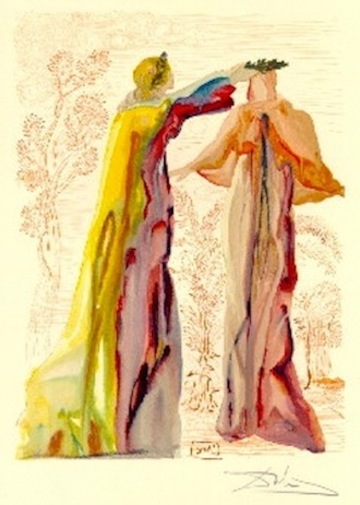Thinking of religion and “free thought,” Haines speaks some
very British words: "I should think you are able to free
yourself. You are your own master, it seems to me." He no
doubt intends something like the stirring conclusion to
William Ernest Henley's Invictus: “I am the master
of my fate: / I am the captain of my soul.” The rational,
secular, rightthinking individual should be able to take
charge of his life and purge his mind of claptrap like "that
idea of a personal God." Ironically, though, the conjunction
of freedom and self-mastery in Haines' words also evokes the
doctrines of Catholicism, as represented in Dante's Purgatorio.
In Purgatorio 27, having entered the Earthly
Paradise, Virgil tells Dante that all his arduous instruction
and discipline has come to its end. He has brought the pilgrim
to this point “with intellect and will skill.” Now Dante may
follow his own pleasure:
Don’t wait any more for my word or signal;
Free, upright, and sound is your will,
And you would do wrong not to do as it counsels:
Therefore I crown and miter you over yourself.
(27.139-42, my trans.)
Dante has freed himself from sin and can reliably guide his
own actions. All the souls climbing the mountain of Purgatory
do this. Their exit from the final circle and return to the
garden of Eden signifies the perfection of their corrupted
wills—an ethical reconstitution that is a prerequisite for the
intellectual contemplation of Paradise. They are liberated
from sin, freed from the bondage of earth’s gravity, able to
rise to the vision of God.
If Stephen hears echoes of Catholic doctrine in Haines’
words—and he probably does, given the fact that he has just
been quoting from Dante himself—he must do so with a
host of ironic reflections. The freedom promised by the
Catholic Church means simply the ability to say Yes or No to
God, and saying Yes means surrendering one’s will wholly to
the divine will (as Dante’s Paradiso makes clear).
Furthermore, freeing oneself from this total
subjection, once it is in place, is much more difficult for an
Irish Catholic than for someone nurtured by the tepid bosom of
English Protestantism. Stephen is “a horrible example
of free thought” because he lives every day
tortured by his apostasy, crushed by the guilt he associates with his
mother, trembling in fear before the God he disbelieves in.
The Dantean allusion, then, seems to undermine Haines'
contention that "You are your own master,"
and Stephen responds by saying, "I am the servant of two masters
. . . The imperial British state . . . And the holy Roman
catholic and apostolic church." Nonetheless,
Dante's words do proclaim freedom from precisely these two
masters, State and Church: that is the meaning of "Therefore I
crown and miter you over yourself." So Haines is ultimately
giving Stephen good advice, and Stephen is trying to do
something like what Haines recommends when, in Circe,
he "taps his brow" and says, "in here it is I
must kill the priest and the king."
